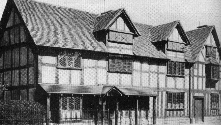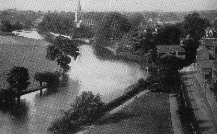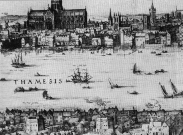

William Shakespeare was born in 1556 in the English town of Stratford-on-Avon. His father, John, was a well known man in Stratford at the time. He was a glover by trade and had become and wealthy and owned five buildings. Young William went to school, but only went to primary school.
Despite his lack of education, Shakespeare moved to London and eventually wrote 35 plays (some in multiple parts). His plays remain widely popular and are still performed all over the world. He was also a poet, and was a master of the sonnet, a type of poem consisting of rhyming couplets. In his time, drama was not considered literature, like movie scripts today. Some of his plays were not published until years after he died in 1616.
The reason for Shakespeare's timeless popularity is the timeless nature and vivid descriptions in his works. He wrote with such fantastic imagery and conviction that the characters seem to be real and just like you would imagine them. Shakespeare had great knowledge of all kinds of people, from noblemen to sailors. The first scene in The Tempest proves he knew much about seamen and vessels, although he never had been to sea.
Below are tables showing Shakespeare's four writing periods and a complete list of plays. The first period started around 1590, when he had just moved to London from Stratford, and the fourth ended just years from his death.
Shakespeare followed current trends in theatre, yet included extreme originality. When tragedies were popular, Shakespeare penned them. When people wanted history, he delivered tales of the lives and times of English kings. Because of this, he amassed a great fortune and had houses in London and his hometown of Stratford, where his wife and three children lived.
Go back to Table of Contents
| The First Period | ||
|---|---|---|
| Dates of First Performance | Title | Date of Publication |
| 1590-1592 | Henry VI, Part II | 1594 |
| 1590-1592 | Henry VI, Part III | 1595 |
| 1590-1592 | Henry VI, Part I | 1623 |
| 1591-1593 | The Comedy of Errors | 1623 |
| 1593-1594 | Titus Andronicus | 1594 |
| 1592-1593 | Richard III | 1597 |
| 1594-1595 | Love's Labour's Lost | 1598 |
| 1593-1594 | The Taming of the Shrew | 1623 |
| 1594-1595 | The Gentleman of Verona | 1623 |
| The Second Period | ||
|---|---|---|
| Dates of First Performance | Title | Date of Publication |
| 1594-1595 | Romeo and Juliet | 1597 |
| 1595-1596 | Richard II | 1597 |
| 1594-1596 | A Midsummer Night's Dream | 1600 |
| 1596-1597 | King John | 1623 |
| 1596-1597 | The Merchant of Venice | 1600 |
| 1597-1598 | Henry IV, Part I | 1598 |
| 1600-1601 | The Merry Wives of Windsor | 1602 |
| 1597-1598 | Henry IV, Part II | 1600 |
| 1598-1599 | Much Ado About Nothing | 1600 |
| 1598-1599 | Henry V | 1600 |
| 1599-1600 | Julius Caesar | 1623 |
| 1599-1600 | As You Like It | 1623 |
| 1599-1600 | Twelfth Night | 1623 |
| The Third Period | ||
|---|---|---|
| Dates of First Performance | Title | Date of Publication |
| 1600-1601 | Hamlet | 1603 |
| 1601-1602 | Troilus and Cressida | 1609 |
| 1602-1603 | All's Well That Ends Well | 1623 |
| 1604-1605 | Measure for Measure | 1623 |
| 1604 | Othello | 1622 |
| 1605-1606 | King Lear | 1608 |
| 1605-1606 | Macbeth | 1623 |
| 1606-1608 | Anthony and Cleopatra | 1623 |
| 1607-1608 | Coriolanus | 1623 |
| 1607-1608 | Timon of Athens | 1623 |
| The Fourth Period | ||
|---|---|---|
| Dates of First Performance | Title | Date of Publication |
| 1608-1609 | Pericles | 1609 |
| 1609-1610 | Cymbeline | 1623 |
| 1610-1611 | The Winter's Tale | 1623 |
| 1611-1612 | The Tempest | 1623 |
| 1612 | Henry VIII | 1623 |
| 1612-1613 | The Two Noble Kinsman | 1634 |
Go back to Table of Contents
Shakespeare wrote in a time when their was no standard from of the English language. In his time, four hundred years ago, it was much easier to influence the language and create new words. Shakespeare is credited with coining several new words and phrases. These include common sayings like:
And words like:
Without Shakespeare's contributions to english, this language would be much duller and a whole lot less original.
Go back to Table of Contents





Go back to Table of Contents
Some lines from Shakespeare's plays are so memorable they are often
cited and used in everyday life. Here is my pick of the best:
Now is the winter of our discontent
Made glorious summer by this sun of York.
King Richard, Act I, Sc. 1, 1-2
He jests at scars, that never felt a wound.
Romeo and Juliet, Act II Sc. 2, 1
What's in a name? That which we call a rose
By any other name would smell as sweet.
Romeo and Juliet, Act II, Sc. 2, 43-44
A plague o' both your houses!
Romeo and Juliet, Act III, Sc. 1, 103
Uneasy lies the head that wears a crown.
Henry IV, Part II; Act III, Sc. 2, 28-29
I am Sir Oracle
And when I ope my lips, let no dog bark!
The Merchant of Venice, Act I, Sc. 1, 93-94
God made him, and therefore let him pass for a man.
The Merchant of Venice, Act I, Sc. 2, 60-61
Every one can master a grief but he that has it.
Much Ado About Nothing, Act III, Sc. 2, 28-29
For there was never yet philosopher
That could endure the toothache patiently.
Much Ado About Nothing, Act V, Sc. 1, 35-36
Cowards die many times before their deaths;
The valiant never taste death but once.
Julius Caesar, Act I, Sc. 2, 32-33
O, how full of briers is this working-day world!
As You Like It, Act I, Sc. 3, 12
If ladies be bright and fair,
They have the gift to know it.
As You Like It, Act II, Sc. 7, 120
True is it that we have seen better days.
As You Like It, Act II, Sc. 7, 120
If music be the food of love, play on;
Give me excess of it, that, surfeiting,
The appetite may sicken, and so die.
Twelfth Night, Act I, Sc. 1, 1-3
We are such stuff
As dreams are made on, and our little life
Is rounded with sleep.
The Tempest, Act IV, Sc. 2, 262-263
Neither a borrower nor a lender be;
For loan oft loses both itself and friend,
And borrowing dulls the edge of husbandry.
Hamlet, Act I, Sc. 3, 78-80
The rest is silence
Hamlet, Act V, Sc. 2, 369
To be, or not to be: that is the question:
Whether 'tis nobler in the mind to suffer
The slings and arrows of outrageous fortune,
Or to take the arms against a sea of troubles,
And by opposing end them. To die: to sleep;
No more; and by a sleep to say we end
The heart-ache, and the thousand natural shocks
That flesh is heir to, 'tis a consummation
Devoutly to be wish'd. To die, to sleep;
To sleep: perchance to dream: ay, there's the rub;
For in that sleep of death what dreams may come,
When we have shuffled off this mortal coil,
Must give us pause: there's the respect
That makes calamity of so long life;
For who would bear the whips and scorns of time,
The oppressor's wrong, the proud man's contumely,
The pangs of despised love, the law's delay,
The insolence of office, and the spurns
That patient merit of the unworthy takes,
When he himself might his quietus make
With a bare bodkin? who would fardels bear,
To grunt and sweat under a weary life,
But the dread of something after death,
The undiscover'd country from whose bourn
No traveller returns, puzzles the will,
And makes us rather bear those wills we have
Than fly to others that we know not of?
Thus conscience does make cowards of us all,
And thus the native hue of resolution
Is sicklied o'er with the pale cast of thought,
And enterprises of great pitch and moment
With this regard their currents turn awry
And lose the name of action.
Hamlet, Act III, Sc. 1, 56-88
We burn daylight:
The Merry Wives of Windsor, Act II, Sc. 1, 54
How sharper than a serpent's tooth it is
To have a thankless child!
King Lear, Act I, Sc. 4, 310-311
Go back to Table of Contents
These synopses of the plays come from World Book Encylcopedia; Volume 17; © 1966. The excerpts were taken from pages 292-295.
Visit the World Book Homepage
The scenes of this delightful comedy are laid chiefly in the Forest of Arden,
where shepherds lead an easy life and everything is "as you like it." To the forest
come an exiles French duke and his followers, leaving at the court his daughter
Rosalind; his younger brother, Duke Frederick, who has taken his place; and Frederick's
daughter Celia, who pleads so eloquently for her cousin's companionship that
Frederick allows Rosalind to remain. In a court match, the Duke's professional
wrestler is overcome by a youth named Orlando, who proves to be the son of an old
friend of Rosalind's father. Rosalind and Orlando fall in love, but they are soon
separated. Rosalind is bannished by Frederick. With Celia, who refuses to desert her,
and Touchstone, the court jester, she takes refuge in Arden. There the girls buy a
farm and live as brother and sister. Celia poses as a shepherdess and the taller
Rosalind wears mans clothes and calls herself Ganymede, a young shepherd.
Meanwhile, Orlando flees to Arden with his old servant Adam, to escape the
plotting of his murderous brother Oliver, and finds a refugee with the bannished
Duke. His love verses to Rosalind, which he carves on the trees are read by the
disguised Rosalind. When they meet, she tests him by offering to impersenate
Rosalind so that he may be cured of his love by meetings and conversations with
her. Reluctantly, Orlando consents, to Rosalind's delight. Now and then the
Melancholy Jacques contributes a bit of sour philosophy. One day Orlando kills and is
wounded by a lion that is attacking his brother Oliver, who has come to the forrest
in search of him. The penitent Oliver, sent to Ganymede with note explaining why
Orlando is delayed in keping a tryst, sees Celia and falls in love with her.
The play ends happily a wedding of four couples. Rosalind resumes her feminine
dress and is wed to Orlando. Touchstone is wed to the country maid Audrey. Oliver is
wed to Celia. The shepherd folk, Phebe and Silvius, complete the party. In the midst
of this rejoicing word comes that Duke Ferdinand has restored the dukedom to Rosalind's
father, and at the end all is well.
Perhaps the most famous of Shakespeare's plays, Hamlet is a drama of revenge. Hamlet, a young prince of Denmark, is grieved and mystified by the sudden death of his father; by his mother's hasty marriage with the dead king's evil, plotting brother, Claudius, who has taken the throne; and by the stupidity and (as he thinks) faithfulness of his sweetheart Ophelia, the daughter of Polonius. His friend Horatio tells him that a ghost resembling his father is appearing nightly before the castle, and Hamlet watches for a specter. In a thrilling night scene he is told the story of his father's murder by Claudius. Hamlet's actions have been variously interpreted. Most critics believe he only pretends madness to lull suspicion and to get opportunities for revenge. His course is especially distressing to Ophelia. Shocked and overwhelmed by the evil in his world, Hamlet must await the right moment to act, and broods over the pain of life. He even thinks of suicide. A band of strolling players arrive, and Hamlet traps the king by having the actors speak certain lines about a king's being murdered by his brother. Claudius pretends illness and leaves the hall, thus proving his guilt. Later in his mother's room, Hamlet scolds her for her conduct. During this interview he thrusts his rapier through a curtain behind which he thinks the king is hiding, but kills old Polonius instaed, who is eavesdropping.
The alarmed Claudius sends Hamlet to England under escort of Rosencrantz and Guildenstern. Hamlet finds they have written orders to have him killed, and secretly substitutes their name their names for his. He escapes and returns to Denmark. He arrives in time to witness the burial of Ophelia, who has lost her reason and been drowned. At the grave, a meeting between Hamlet and Ophelia's brother Laertes, who plots with Claudius to kill the prince is followed by a fencing duel between the young men. Laertes uses a poisoned foil with which he wounds Hamlet. In the struggle, the weapons are exchanged and the young prince turns his weapon on Laertes. Before Hamlet dies, he also succeeds in stabbing his treacherous uncle. The guilty mother accidentally drinks the poisoned cup prepared for Hamlet.
The two parts of this historic play form a dramatic whole, and give a vivid picture of England in the 1400s. The chief characters are King Henry IV, who is conscience-stricken for having taken the throne dishonestly from Richard II; his two sons, the merry Prince Hal and Prince John; Hotspur (Henry Percy), son of the Earl of Northumberlan; and Sir John Falstaff, a low-driving, fat and jolly old warrior whose escapades provide most of the humor of the play. Falstaff is Prince Hal's favorite companion. King Henry longs to go on a crusade to make up for his sins, but is delayed by a rebellion in Scotland and Wales. He quarrels with Hotspur over the delivery of the prisoners taken on the field at Holmedon, and the Percys revolt against him. On the field at Shrewsbury, Hotspur is slain by Prince Hal. In the concluding scenes of part I, Falstaff pretends death to avoid being killed.
In part II, there is a continuation of the clowning of the Fastaffians, mixed
with the story of the tired old king, approaching his end and worried over the
Percy rebellion. News comes of the end of the disorder through the hand to Prince
John, who has offered the rebels peace with honor, and had the scattering troops killed and
the leaders executed. The death of King Henry follows, and Prince Hal is crowned
Henry V. He shows himself a real king, and forbids the Fastaffiansto come within
ten miles of him until they reform.
The stirring period of the declining Roman republic and a great historic character furnish the background for this magnificent drama. But in spite of its name, the play is the tragedy of Brutus, Caesar's best friend, about whom the drama is built around and who has five times as many lines as Caesar. It begins on a high note- victorious Caesar is escorted to the Capitol by enthusiastic admirers and three times refuses the crown offered by Mark Antony. But already storm clouds are gathering. Patriotic Brutus, the "lean and hungry" Cassius, and blunt speaking Casca are plotting Caesar's downfall, for they fear that he is becoming a dictator and that his kingly rule will put an end to the republic and Roman liberty. Caesar is warned by a fortune teller to "beware the Ides of March," but on that day he goes to the senate house and is stabbed to death. He resists until he sees Brutus' dagger. Then he falls with his cloak about him and falls with "Et tu, Brute" (Thou too, Brutus) on his lips.
Brutus persuades the fickle mob that murder was necessary to save the republic, but unwisely permits Antony to deliver a funeral oration over Caesar's body. The clever Antony turns the people against the plotters, who are forced to flee. Antony, Caesar's grand-nephew Octavius, and Lepidus form a triumvirate and lead an army against them. On the plains of Phillipi, the night before the battle, Brutus is startled by the ghost of Caesar and forsees his own doom. The battle is lost, Cassius orders his servants to kill him, and Brutus falls on his sword, realizing he had killed a man he both honored and loved and that Antony and Octavius will be worse masters for Rome than Caesar ever could have been.
The tragic story of King Lear gives a dramatic presentation of the relationships between parents and children. Lear, the king of Britain, prepares to divide his kingdom among his three daughters:Goneril, wife of the Duke of Albany; Regan, wife of the Duke of Cornwall; and Cordelia, the youngest and best loved. The father childlishly asks for an expression of their daughterly affection, and is so deceived by the older girls' flowery endearments, and so angered at Cordelia's modest, though sincere, statement, that he disinherits her and arranges to live with the other two in turn. The good Earl of Kent is banished forever because he interfered in Cordelia's behalf, but the girl finds a haven in the love of the King of France, who marries her.
Kent returns in disguise to look after the king and finds Goneril ordering him to reduce his train of followers by half. Angry and hurt by Goneril's ingratitude, Lear meets Regan at the castle of the Earl of Gloucester. She harshly repulses him, and in despair he staggers out into a night storm. With Kent and the faithful court fool, the old king, who is now insane, finds refuge in a hut. He there meets Gloucester son Edgar, who, disguised as a madman, Tom O'Bedlam, is fleeing from the plots of his wicked half brother Edmund. Gloucester arrives with two offers of shelter, and has landed an army prepared to restore her father's rights.
In camp the broken old man is tenderly cared for by Cordelia, and thinks himself in Heaven. Meanwhile, Gloucester eyes are put out by Cornwall, and he is cared for by Edgar. I a battle between the English, commanded by Edmund, and the French, the French are defeated, and Cordelia and Lear are taken prisoners. Edgar discloses his identity to his dying father, and kills Edmund in a trial by combat. But he is too late to save Cordelia, whom Edmund has ordered hanged. Lear dies. Goneril, jealous of her sister's love for Edmund, poisons Regan, and then stabs herself. The tragedy is intensified by the bitter jets of the court fool. His loyal affection for his master shines through his apparent foolery.
Macbeth is the story of one who suffered disaster through too much ambition. The scenes are laid in Scotland. On his return from a successful campaign in the north, Macbeth, accompanied by Banquo, meets three witches who hail him as Thane of Glamis, Thane of Cawdor, and the King of Scotland, respectively, and prophesy that sons of Banquo will occupy the throne. The first seeds of ambitous desires are planted at this time. Macbeth is already Thane of Glamis, and is soon appointed the Thane of Cawdor by King Duncan. With the vision of kingship before him, and urged on by his wife, Lady Macbeth, Macbeth murders the king while he is a guest in Macbeth's home. The two sons of Duncan flee in terror from the castle, and draw suspicion from the murder to themselves. Macbeth is crowned king, but is uneasy concerning the witches' prophesy about Banquo and his sons. Accordingly, he hires assassins to murder Banquo and his son Fleance. At a state banquet, the king is told that Banquo has been slain, but the son has escaped. Here, he sees Banquo's ghost and talks so wildly that the feast breaks up in disorder.
He has another interview with the witches, who tell him to "beware Macduff," but
assure him that "none of the women born" can harm him, and that he need not fear
until Birnam Wood shall come to Dunsinane Castle. Sinking ever deeper in his
crime, Macbeth orders Macduff's wife and children slain when he learns of
Macduff's flight to England. These crimes so affect the queen that she becomes
a sleep walker and finally dies. Macduff raises a large army and advances toward
the castle, wis his troops screened by branches form the trees of Birnam. Macbeth
is horrified at seeing Birnan Wood really coming to Dunsinane, but replies
on the rest of the prophesy. He meets Macduff, and warns him he will never
yield to one of woman born. Macduff replies that he was "from his mother's womb
ripped." In the battle that follows, MAcbeth is slain and beheaded. Malcolm,
son of Duncan, is then proclaimed king of Scotland.
Go back to Table of Contents
Due to space limitations, it would be impossible to include summaries of all Shakespeare's 35 plays or the complete texts. There are other places on the internet that due. Listed below are links to other sites with texts, summaries, and information about Shakespeare.
Everything Shakespeare ever wrote, including poetry and a glossary.
A directory of links including complete texts, the Folger Shakespeare Library and The Elizebethan Review.
A site with the complete drama and poems. Includes sonnets, The Rape of Lucrece, and Venus and Adonis.
Comprehensive study of all 154 sonnets.
Materials on Julius Caesar, King Lear, Macbeth, Othello and Twelfth Night. Includes links to other sites.
Comprehensive Study on Julius Caesar
All about Julius Caesar, including comprehension aides, essays and general resources.
Shakespeare in Love, the movie
Review and summary of new movie Shakespeare in Love, a fictional account of the Bard and how he came to write Romeo and Juliet
A site dedicated to the study of Shakespeare's Globe Theatre, including 3D rendering
For people who live in Oregon, the Ashland Shakepeare Festival is a unique and cultural experience to be proud of. Happening every summer in Ashland, Oregon, it features outdoor performances of Shakespeare. It is one of the largest such festivals in the nation. So if you live in Oregon or not, the Ashland Shakespeare Festival is definitly worth checking out. Visit the ASF Homepage today!
I am a 15 year old Freshman at Oregon City High School in Oregon City, Oregon. This page was made for an English report on Shakepeare and Romeo and Juliet. This is my first site, so please excuse the simpleness of it. Most of my information comes from Volume 17 of World Book Encyclopedia, © 1966.
Send me E-Mail